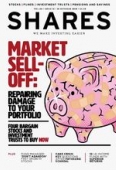Archived article
Please note that tax, investment, pension and ISA rules can change and the information and any views contained in this article may now be inaccurate.
Will Patisserie shareholders receive compensation?

Investors in fancy cake seller Patisserie (CAKE:AIM) are hoping the value of their shares haven’t been damaged too much as a rescue financing package to repair a big hole in its accounts takes effect.
However, there are lingering questions from this unsavoury and certainly far from sweet episode, plus investors may now be asking if they can receive compensation as previous accounts were misleading.
On 10 October shares in Patisserie were suspended after the company revealed significant and fraudulent accounting irregularities that led to a mis-statement of its accounts.
Finance director Chris Marsh, who was suspended this week, was arrested on Thursday and has been released on bail.
The company now calculates it had a £9.8m net debt position rather than the previously stated £28.8m net cash position.
It has subsequently raised £15.7m via a share placing at 50p (prior to its suspension the shares were trading at more than 400p).
Chairman Luke Johnson is providing a £10m bridging loan pending receipt of the share placing proceeds, plus another £10m longer term loan.
While existing shareholders are not facing complete wipe out, as would probably have been the case had the company gone bust, the value of their investment in the business looks set to be just a fraction of what it was before this scandal came to light.
Sometimes you can spot a situation like this arising. If a company’s earnings are not being matched by cash flow, for example, then this should ring alarm bells. But this was not apparent at Patisserie, whose balance sheet and cash generation based on the reported figures looked rock-solid.
Fortunately, instances of faulty accounting or outright fraud are relatively rare. The next question is whether Patisserie shareholders be able to claw back any compensation for their losses?
WHAT HAPPENED AT TESCO?
In 2017 Tesco (TSCO) launched a scheme to compensate investors who had bought shares in the company after it overstated profits in a 29 August 2014 trading update – subsequently correcting its accounts on 22 September 2014.
The Financial Conduct Authority used its powers to compel Tesco to pay out £85m in compensation to shareholders who had invested between 29 August and 19 September 2014 (i.e. on the basis of the faulty profit figure).
As yet we do not know the full extent of the accounting irregularities at Patisserie, but we definitely know the first half results on 15 May were inaccurate so applying the same principle as in the Tesco case, anyone who invested in Patisserie since between that date and close on 9 October would theoretically be eligible, should it be forced to pay compensation.
Tesco had deep enough pockets to fund a compensation scheme, so where would the money come from at Patisserie? Tesco is a Main Market company and as such investors enjoy greater protections than they do when investing in AIM stocks.
What’s certainly the case is such a dramatic near-collapse at a previous AIM darling is unlikely to do anything for the reputation of London’s junior market. (TS)
Important information:
These articles are provided by Shares magazine which is published by AJ Bell Media, a part of AJ Bell. Shares is not written by AJ Bell.
Shares is provided for your general information and use and is not a personal recommendation to invest. It is not intended to be relied upon by you in making or not making any investment decisions. The investments referred to in these articles will not be suitable for all investors. If in doubt please seek appropriate independent financial advice.
Investors acting on the information in these articles do so at their own risk and AJ Bell Media and its staff do not accept liability for losses suffered by investors as a result of their investment decisions.

 magazine
magazine








